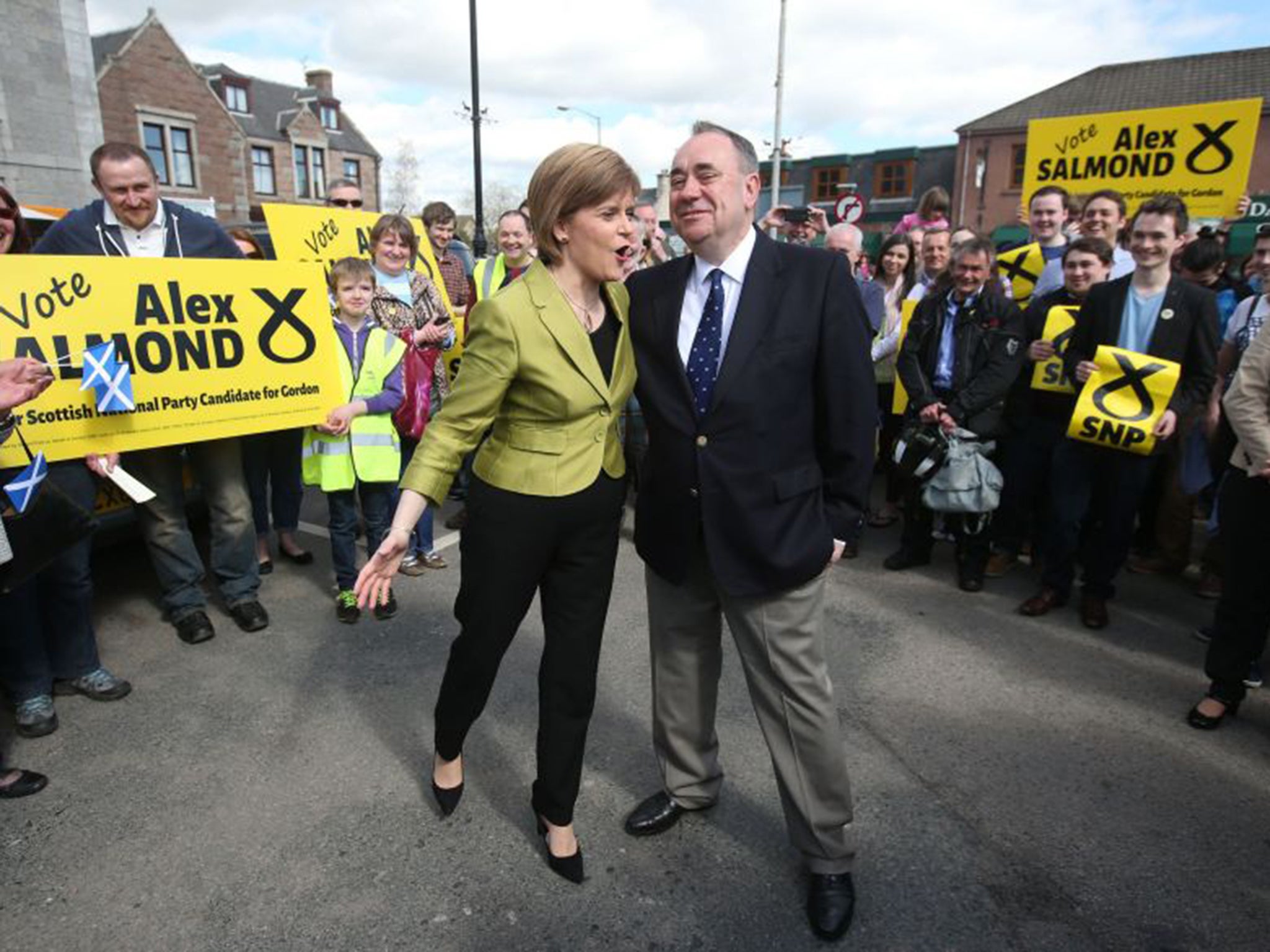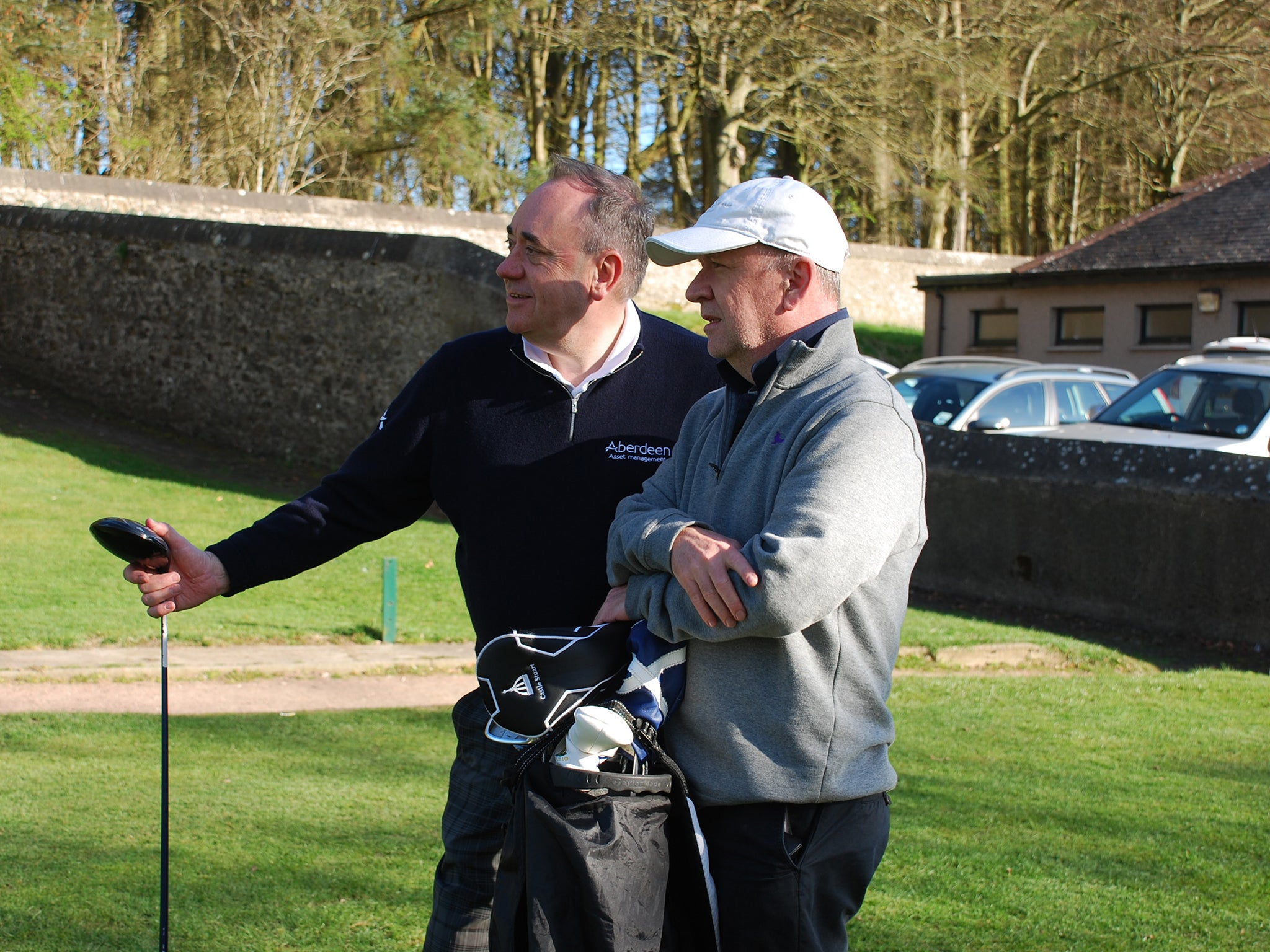General Election 2015: How Alex Salmond could swing independence for Scotland... and a win for Labour
The ex-first minister tells James Cusick how the SNP could still cut a deal with Ed Miliband

Your support helps us to tell the story
From reproductive rights to climate change to Big Tech, The Independent is on the ground when the story is developing. Whether it's investigating the financials of Elon Musk's pro-Trump PAC or producing our latest documentary, 'The A Word', which shines a light on the American women fighting for reproductive rights, we know how important it is to parse out the facts from the messaging.
At such a critical moment in US history, we need reporters on the ground. Your donation allows us to keep sending journalists to speak to both sides of the story.
The Independent is trusted by Americans across the entire political spectrum. And unlike many other quality news outlets, we choose not to lock Americans out of our reporting and analysis with paywalls. We believe quality journalism should be available to everyone, paid for by those who can afford it.
Your support makes all the difference.As the politician with the most recent experience of leading a minority government, Alex Salmond knows what lies ahead if Ed Miliband needs crutches supplied by the SNP to limp into Downing Street.
“Look, there will be no Rose Garden moment,” he said. “Labour and the SNP won’t be in a coalition. There will be no need for a lengthy, signed document.” But, if Labour wants SNP backing: “A deal can be done quickly.”
The SNP is forecast to take Scotland on 7 May in a monumental shift that will question whether the word “United” is left with any meaningful place alongside “Kingdom”. Mr Salmond rejects the notion that a thinly defined “agreement” between the nationalists and Labour will mean “instability”. But neither he nor Nicola Sturgeon, has yet spelt out the price of their support.
There is no secret as to what is likely to be the SNP’s priority. The first line of its constitution reads: “The aim of this party shall be independence for Scotland.” It wants national sovereignty, and a Scottish parliament whose authority is limited only by the Scottish people.

With 40 to 50 MPs at Westminster, and elections for Holyrood imminent next year, the SNP covets one key power that Mr Miliband may have to give up: Holyrood to be given the right to hold a referendum whenever it chooses, not when Westminster gives permission.
Although Mr Salmond resigned and shouldered the blame for losing the 2014 referendum, he has abandoned all thoughts of a quiet life. For him to be back in the political mix, though, the SNP’s elder field marshal first needs to win the Aberdeenshire constituency of Gordon, a seat the “Liberals” have held for 32 uninterrupted years.
But those victories were, he insists, “in a different Scotland”. The SNP has been in power in Holyrood for the past seven years and those looking bemused at what’s happening should, he says, “look around and see attitudes have changed”.
Speaking at a hustings meeting in the constituency’s town of Ellon, Mr Salmond hinted at the importance of Holyrood gaining the power to call another referendum. The Conservative candidate, Colin Clark, wanted him to promise that another poll on independence would be at least 15 years away.
Last year both Mr Salmond and Ms Sturgeon emphasised the in-out vote was a “once-in-a-generation” issue. However, those at Ellon Hall were enlightened as to what this actually meant. “I never said that [another referendum would have to wait 15 years],” he said. “I said a once in a life-time ‘opportunity’ – and it will be Scottish people who’ll determine when that opportunity is.”
There were jeers from the audience, but not enough to suggest that the tactical voting campaigns that have recently sprung up across Scottish marginal seats – many funded by Conservative money – will allow the local Lib Dem candidate, Christine Jardine, a former Downing Street aide, to ease Nick Clegg’s anticipated pain. Some senior SNP figures who have watched the demise of the Lib Dems fear any extended association with Labour could backfire, thus advocating that any deal should have a brief half-life. But those focused on what impact 50 SNP MPs could have on the progressive direction of travel of the next government may be missing the point. Mr Miliband could indeed emerge as prime minister; but the SNP may decide how long he lasts, and even on Mr Salmond’s definition, that isn’t stable government.
During a fundraising round of golf at Ellon’s McDonald Club for his local SNP branch, with The Independent on Sunday’s political correspondent acting as his advisory caddy, Mr Salmond expounded on how the SNP has an advantage if this election produces a minority government – it has been here before.
For four years from 2007, Mr Salmond, as Scotland’s first minister in Holyrood, faced the knife-edged arithmetic of having just one seat more than Labour. If the other main three parties had ganged up they could have taken him out. He survived, and thrived, on the adversity.
“The electorate liked the idea of us getting through policies like free university fees, ironically backed by the Liberals Democrats, acting with Labour to abolish prescription charges, and with the Tories on lower business rates. We got things done on a vote-by-vote basis. It can work. Nick Clegg and the Lib Dems showed how not to do it. They had a key policy – electoral reform – and at the first hurdle they sacrificed it rather than demanded it. You don’t do that.”
On the course, with talk of swings largely confined to the way a golf ball is travelling, he said one thing could have made the critical difference in last year’s referendum vote. The opinion poll that gave the SNP a lead for the first time, he said, came too early. “It left [the unionist opposition] time to reorganise, rethink what they could do. If that poll had come, say, with only a week left, we would have won. This time? I think there are no people who want to vote for us that will be scared this time.”
Before his round of golf, Mr Salmond visited the nearby Brewdog brewery. Started in 2007 by two 24-year-olds from Fraserburgh with “scary loans”, the brand now produces 27 million bottles of craft beer that sells in 53 countries. Co-founder Martin Ritchie said he didn’t like what the large producers were doing and so just decided to make beer that he’d drink. The success is down to two passionate, clever brewers with shrewd business minds. From Mr Salmond’s perspective, it’s evidence of the new Scotland he created.
Written on Christopher Wren’s tomb is: “If you seek his monument, look around.” Brewdog, for Mr Salmond, is the St Paul’s of Aberdeen. This brewery, rather than a cathedral, will suit him just fine – for now.
Tactical voting
Alex Salmond faces a backlash in his battle to win Gordon, with Labour and Conservative supporters urged to vote Liberal Democrat to keep Scotland’s former first minister out of the House of Commons.
Gordon was held by Sir Malcolm Bruce, the Lib Dems’ deputy leader, since 1983, but he has stepped down to be replaced by journalist Christine Jardine. Mr Salmond is currently favourite for the seat, but Lib Dem strategists believe it will be a close fight, with Labour and Tory voters increasingly saying they will vote for Ms Jardine.
A campaign group, United Against Separation (UAS), has been asking voters across Scotland to ignore their loyalties and instead vote for whichever party stands the best chance of beating the SNP in each seat.

The group has argued that “tactical voting is a must in Gordon” and has told voters that Ms Jardine is the “best placed pro-UK candidate” to defeat Mr Salmond. A UAS campaign leaflet features a cartoon of Ms Jardine sending Mr Salmond flying after drop-kicking him on the bottom.
A Lib Dem minister said: “Alex Salmond makes the argument for tactical voting just by being Alex Salmond. I think we will win it. The campaign is going well. It’s close and could go either way.”
The Lib Dems have been widely tipped to lose nearly all of their 11 seats north of the border. But Scottish Lib Dems were buoyed last week after a Survation poll carried out for the party found that consumer affairs minister Jo Swinson is on course to retain East Dunbartonshire.
Mark Leftly
The Independent has got together with May2015.com to produce a poll of polls that produces the most up-to-date data in as close to real time as is possible.
Click the buttons below to explore how the main parties' fortunes have changed:
All data, polls and graphics are courtesy of May2015.com. Click through for daily analysis, in-depth features and all the data you need. (All historical data used is provided by UK Polling Report)
Join our commenting forum
Join thought-provoking conversations, follow other Independent readers and see their replies
Comments